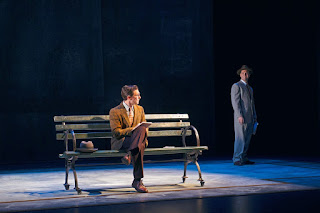A Petri dish of a play: Small-town Texas grows a peculiar culture in Beef & Boards' "Greater Tuna"

It's tempting to read into the production of "Greater Tuna" on the cusp of the New Year a politically Townsladies Vera and Pearl look down witheringly on the deceased Judge. tinged scaling back. It feels like a narrowing in ambition, scope, and humanity from the company's counterpart at the turn of last year, the somewhat perplexing but captivating murder-mystery-comedy "Shear Madness ." Seen Saturday night at Beef & Boards Dinner Theatre, "Greater Tuna" winds down the farcical elements to a couple of virtuoso displays in the realm of caricature, handled with energetic abandon by B&B favorites Jeff Stockberger and Eddie Curry. It's difficult to put aside the play's barrage of comic barbs directed at small-town life, particularly with conventionally benighted Texas as the exclusive target. Urban for almost my whole life, I may appear oddly ill-at-ease about the dismissal urbanites often direct toward America in the boondock





